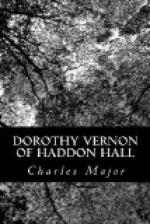John, of course, was speechless. He had received only what he deserved. I freely admit he played the part of a fool during this entire interview with Dorothy, and he was more fully convinced of the fact than either you or I can be. I do not like to have a fool for the hero of my history; but this being a history and not a romance, I must tell you of events just as they happened, and of persons exactly as they were, else my conscience will smite me for untruthfulness. Dorothy’s last assault was too much for John. He could neither parry nor thrust.
Her heart was full of mirth and gladness.
“None other but you, John,” she repeated, leaning forward in front of him, and looking up into his eyes. A ray of moonlight stealing its way between the forest boughs fell upon her upturned face and caused it to glow with a goddess-like radiance.
“None but you, John. There never has been and there never shall be another.”
When John’s consciousness returned he said, “Dorothy, can you love such a fool as I?”
“That I can and that I do with all my heart,” she returned.
“And can you forgive me for this last fault—for doubting you?”
“That is easily done,” she answered softly, “because doubt is the child of love.”
“But you do not doubt me?” he replied.
“N-o-o,” she answered somewhat haltingly; “but I—I am a woman.”
“And a woman’s heart is the home of faith,” said John, reverentially.
“Y-e-s,” she responded, still not quite sure of her ground. “Sometimes it is the home of too much faith, but faith, like virtue, is its own reward. Few persons are false to one who gives a blind, unquestioning faith. Even a poor degree of honor responds to it in kind.”
“Dorothy, I am so unworthy of you that I stand abashed in your presence,” replied John.
“No, you are not unworthy of me. We don’t look for unmixed good in men,” said the girl with a mischievous little laugh. Then seriously: “Those virtues you have are so great and so strong, John, that my poor little virtues, while they perhaps are more numerous than yours, are but weak things by comparison. In truth, there are some faults in men which we women do not—do not altogether dislike. They cause us—they make us—oh, I cannot express exactly what I mean. They make us more eager perhaps. A too constant man is like an overstrong sweet: he cloys us. The faults I speak of hurt us; but we thrive on them. Women enjoy pain now and then. Malcolm was telling me the other day that the wise people of the East have a saying: ’Without shadow there can be no light; without death there can be no life; without suffering there can be no joy.’ Surely is that saying true of women. She who suffers naught enjoys naught. When a woman becomes passive, John, she is but a clod. Pain gives us a vent—a vent for something, I know not what it is; but this I know, we are happier for it.”




